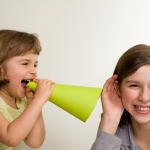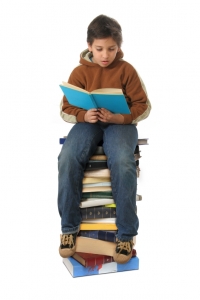 Childhood Communication
Childhood Communication
A series of articles written exclusively for OVL by Jacqui Wright
Independent Speech and Language therapist, Jacqui Wright, has over 22 years experience in South Africa, the U.S.A. and the UK. She is author of ‘Cracking the Literacy Puzzle’, RCSLT Bulletin, March 2006. Here, Jacqui from Childhood Communication Consultancy, based in Carlton, discusses Listening and Literacy.
Childhood Communication Consultancy (CCC) specialises in assessing and treating children ages 0-19 years old with speech, language, listening, literacy, learning and social communication difficulties.
In order to develop speech and language skills, a child needs to learn to listen. Listening can be passive or active. Passive listening is hearing the various sounds in the world around us i.e. a telephone or speech, and active listening is focusing attention on those sounds for a purpose i.e. the doorbell ringing means that people are visiting and I will go to greet them; I listen to the words in a sentence or sounds in a word to gain their meaning. Active listening is processing what is heard; this is also called ‘auditory processing’. In the absence of a hearing impairment, a child may have difficulties in processing or making sense of what he /she can physically hear which is called an ‘auditory processing difficulty’.
Auditory processing difficulties can present as some or all of the following:
- The child daydreams or is disruptive as he/she can’t listen for a prolonged period.
- The child daydreams or is disruptive as he/she can’t listen for a prolonged period.
- The child has difficulty following instructions and often copies a peer.
- The child has difficulty listening when there is background noise.
- The child dislikes certain loud sounds or is oversensitive to some sounds i.e. the vacuum cleaner.
- The child dislikes certain loud sounds or is oversensitive to some sounds i.e. the vacuum cleaner.
- The child’s speech can be unclear. It may appear mumbled especially on longer multi-syllablic words i.e. um/bre/lla or he/li/cop/ter.
- The child has word finding problems; he/she knows certain words but struggles to find them when wanting to say them. This makes the child’s speech dysfluent at times.
- The child finds it difficult to follow a teacher talking, a conversation or answer questions as he/she is unsure of what was said and can’t get the meaning from parts that were heard. Due to this, the child has difficulties in the classroom, with social interaction and developing friendships.
- The child has difficulty with reading and spelling. He/she struggles to encode sounds into words (blend or build sounds into a word i.e. d-o-g is ‘dog’) or decode sounds in words (segment or break down a word i.e. ‘cat’ is c-a-t)). The child finds syllables and rhymes difficult too. Later, the child will have difficulty listening and writing notes simultaneously.
- The child’s speech can be unclear. It may appear mumbled especially on longer multi-syllablic words i.e. um/bre/lla or he/li/cop/ter.

Typically, auditory processing difficulties are closely linked to an early medical history (up to 4 years) of frequent ear infections and glue ear. This is thought to impair the auditory pathways that transmit sounds from the ear to the brain. There is a correspondence between early glue ear and literacy problems i.e. reluctant readers, poor spellers, and dyslexia. There may also be a family history of speech, mild reading or spelling difficulties, and dyslexia. These speech problems can be due to a motor planning problem (dyspraxia) in the articulators: jaw, tongue and lips and often fine motor hand skills for handwriting are affected too. Speech problems should be corrected by 5 and ½ years otherwise there will be an impact on developing literacy skills. Diagnoses of Attention deficit hyperactivity disorder (ADHD), Autism (ASD) and Aspergers, are also known to have auditory processing difficulties.
Listening and learning literacy are based on complex auditory processing skills (and visual processing skills for tracking words across the page). Sometimes, for various reasons, the auditory processing does not develop as it should. At CCC, the therapist will investigate the auditory processing difficulty as a specific problem or if it is related to a cluster of difficulties. These may include problems with any of the following: Attention, Memory, ADD/ADHD, Dyslexia, Specific Language Impairment, Learning Difficulties, Developmental Speech and Language Delay or Disorder, Dyspraxia/Developmental Co-ordination Disorder, Autism and Aspergers, Semantic-Pragmatic Difficulties, Word Finding Difficulties and Stammering.
Jacqui is an Authorised Provider of The Listening Program www.thelisteningprogram.com In most cases, this 40 week programme of 10 CD’s, listening to high definition filtered sound, greatly improves the child’s listening and attention skills. This programme is done at home for 15 minutes per day with the child attending weekly therapy for active listening as well as other aspects of speech, language and literacy that need to be targeted. For dyspraxic-based speech problems, Jacqui is trained in Talk Tools www.talktools.net to develop the motor programmes for speech. Jacqui considers all the underlying developmental sensory and motoric stages that underpin the development of speech, language, play, listening and communication skills in a child’s treatment programme; all these skills are essential for success with Literacy and in Education. At the Literacy level, she teaches reading, spelling and writing through the mode that the child is able to learn i.e. through synthetic phonics and/or visual recognition as in ‘Picture me reading!’. She also does the Visualising and Verbalising program by N.Bell to enhance reading levels, reading comprehension and inference skills, as weak concept imagery is linked to poor reading achievements.
Listening and literacy difficulties can usually be successfully treated regardless of the child’s age. Earlier intervention is preferable but it is never too late; currently a 6th Former has a therapy programme to improve his skills and grades, and a 13 year old who is making progress for the first time learning to read visually. Please contact Jacqui if you have any concerns about your child’s listening or literacy skills.
Jacqui Wright
Chief Consultant, Childhood Communication Consultancy
BSc (Log) Hons: Speech Pathology/Audiology
MRCSLT, Cert.HCPC, MASLTIP
[email protected]
Tel:01234 782 365
Mob: 079 566 855 81
www.childhoodcommunication.co.uk
